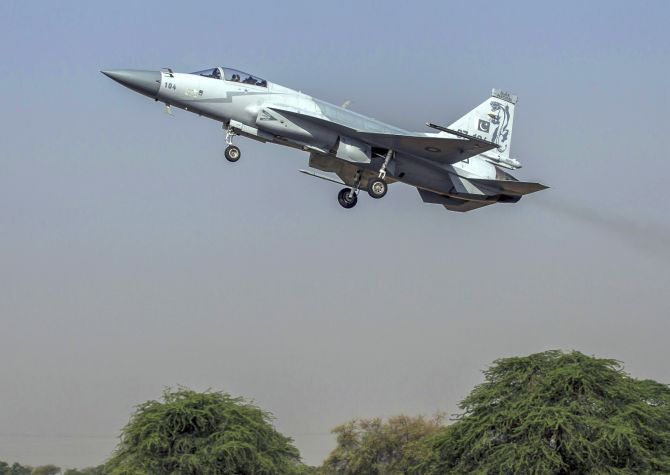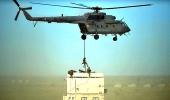'There is hope that in the next 48 to 72 hours there will be some kind of movement forward to de-escalate and not heighten the tension.'

India and Pakistan are on the brink of a major confrontation after the two sides were involved in aerial conflict on Wednesday, which saw the capture of an Indian Air Force pilot by the Pakistan army.
"The capture of an Indian Air Force pilot is not a sad ending or anything. When the nation decides to do these kinds of things (air strikes) these things happen, BharatShakti.in Co-founder and long-time Rediff.com Contributor Nitin A Gokhale tells Syed Firdaus Ashraf/Rediff.com.
Amid heightened tensions between the two countries, Pakistan Prime Minister Imran Khan on Wednesday appealed for peace. How do you think the Indian government will respond?
The Indian government had provided a similar window in its opening statement after the air strike on Tuesday, stating that India did not intend to target any military or civilian population of Pakistan.
Imran Khan has also taken a similar stand by saying there is scope for de-escalation of the situation and for talks. It is quite a conciliatory tone that he has adopted in his statement.
It is very clear neither India nor Pakistan want this to turn into a limited war, leave along a full-fledged war.
There is a window of opportunity for de-escalation, which has now come forward. There is hope that in the next 48 to 72 hours there will be some kind of movement forward to de-escalate and not heighten the tension.
But there is no indication of such action from the briefing by the ministry of external affairs -- that India is ready to scale down attacks on terrorist hubs in Pakistan.
That is why I pointed out to the first statement where India clearly said that our thing was specific targets and it was a counter-terrorist operation. It was not meant to be anything (more).
That window was already provided by India and Pakistan has only opened it wider though Imran's statement.
But there is one factor that needs to be taken into consideration. Pakistan today tried to hit the military headquarters in Rajouri.
If India decides to retaliate on that count, then we have one more step to go in terms of escalation where India will say it reserves the right to hit back as Pakistan said it reserves the right to (hit back at India).
But I think both sides will see to it that this does not go beyond this.
Why do you think Imran Khan is now asking for peace? Does he fear Pakistan will pay a higher price if India goes to war?
Pakistan faces a very dire financial situation. They cannot sustain even three-four days of conventional war, as war is a costly business.
More than that, Pakistan has read straws in the winds. Almost no one (country) has condemned the Indian action.
In fact, Pakistan will be disappointed certainly which it will not show that China, instead of condemning the Indian action, has urged restraint. China has told India and Pakistan, but Pakistan mainly, to initiate a dialogue and start the reconciliation process.
Today, the Russia, China and India trilateral statement also spoke about ending terrorism by all countries.
United States Secretary of State Mike Pompeo also said very clearly that Pakistan must end terrorism emanating from its soil.
So, nobody is with Pakistan now. The international pressure on Pakistan is tremendous.
When you say Pakistan can not sustain war for more than 3-4 days, don't you think India must then opt for a full-fledged war?
It is not in India's interest either to go for war.
If it is imposed on India, we can sustain it longer as we are in a far better place -- economically and militarily -- but war will set India's economic progress and development back.
Even India doesn't want war for very different reasons, as we are on a high growth trajectory and the economy is doing well.
War will be a setback for economic progress and development.
War is absolutely the last option, not only because both of us have nuclear weapons, but also it is a costly affair.
Therefore, India doesn't want war and neither does Pakistan -- for different reasons.
Pakistan would rather have low cost, high impact, options against India like a proxy war which it has been doing in Jammu-Kashmir or do proxy terror strikes across India like it did from 2003 to 2013.
That is why I don't think war is the final outcome or final road towards the problem between the two countries.
There are two steps in between the sub-conventional war that Pakistan wages against India through proxies and what India did in terms of going and striking.
So basically there is an option that India still retains of hitting the targets again in Pakistan.
Why have Indians in general and the Modi government, in particular, believe it is time to teach Pakistan a lesson through air strikes?
Why did we not do so after -- say the Pathankot terror attack or for that matter even after Uri where we did a quick infantry raid?
Let me take you back 10 years. After the 26/11 attacks, a similar option was given by Air Chief Fali Major to the Dr Manmohan Singh government that they will go and strike at the Lashkar-e-Tayiba headquarters in Pakistan.
The government in its wisdom decided it was not the best option and coercive diplomacy would do better. Those times were different and India's stock in the international arena in my view wasn't as high as it is now.
The geopolitical situation wasn't as favourable to India as it is now.
Of course, you have somebody like Modi who has an image of a proactive muscular leader who wants to do whatever is in the national interest must be done at whatever political cost.
Therefore, there are multiple differences between the situation then and situation now.
Modi therefore took the ground operation option after the Uri terror attack and there was no expectation that Pakistan will change its behaviour just because one surgical strike took place.
General D S Hooda, who was the Northern Army commander that time, said it was a message that we wanted to send and it was sent at that time. It could be a sustained policy, but nations don't work in linear ways as the common person would think.
Therefore, there are other things in play. When the Pulwama terror attack happened, Pakistan went beyond India's tolerance. Therefore, this time we could not have done a land surgical operation as they would have been ready.
Therefore, we went beyond the normal envelope of what anybody would have expected by not going inside Pakistan occupied Kashmir, but going beyond -- Balakot, which is close to Abbottabad and in proper Pakistan.
This was a game changer in terms of the red line that India had drawn for itself earlier. The red lines have now been shifted.
India has made its point by doing what it wanted to do. Therefore, I am saying it is time to calm down.
Many critics of the Modi government say it is an election war. Do you believe that?
I don't think the decision was taken because of politics, but certainly this government would have been under pressure to do something.
In a way, the template was set by Modi in September 2016 that if terror from Pakistan goes beyond the tolerance level, then we will have to take kinetic action and military action. And it takes a personality to take such an action.
In the process, he will gain political mileage; there is no doubt from what goes in the betting market and the stock market as everyone thinks this will benefit Modi.
But remember this is three months away from elections and if war escalates and there is a major attack to which India cannot take appropriate action in that time window, then Modi might even lose the elections.
It is a risk he has taken and he has the ability to take that risk, both political and militarily. I won't go with the feeling or emotion that he did only did it for political benefit.
What was supposed to be a great victory in eliminating terrorists across the border has now turned into a crisis as one of our pilots has gone missing. How should India handle this crisis now?
The pilot will come back. When a nation decides to go to war or take kinetic or military action, then these setbacks or losses are inevitable. He was doing his duty by chasing Pakistani intruding aircraft.
In the process, you can call it misjudgement or bad luck, whatever. If you see the video he is absolutely fine. He is upright. He is not panicking or crying.
He is saying he is with the Pakistan army. It is not a sad ending or anything. It is just bad luck that it happened to him. It could happen to anybody.
I think we should wait even if de-escalation does not happen.
Remember during the Kargil War we had a similar situation when Flight Lieutenant Nachiketa was captured in Pakistan and he came back.
When the nation decides to do these kinds of things (air strikes) these things happen.
Tomorrow, it can happen to a Pakistan pilot too. Today, a Pakistan air force plane too went down, but it was just his good luck that when he ejected and parachuted he fell in his own territory and not Indian territory.
The LoC is like that.











 © 2025
© 2025